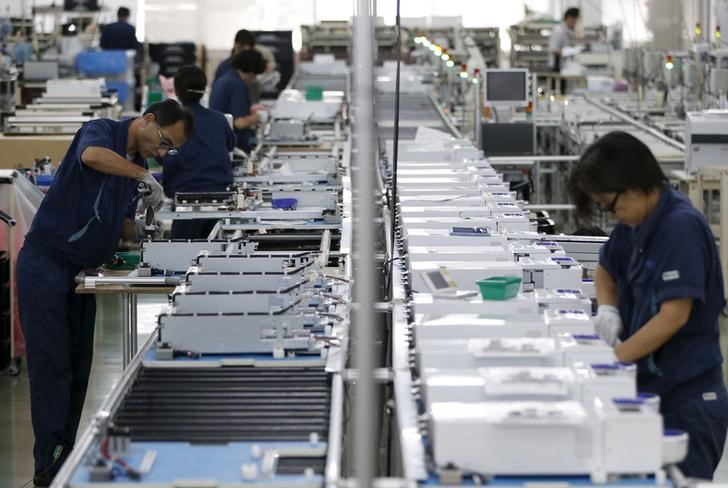By Stanley White
TOKYO (Reuters) - Japan's capital expenditure accelerated in October-December in a sign economic growth will be revised up for the quarter, but economists warn slowing global trade may still yet hurt activity in the first half of this year.
Capital expenditure grew 5.7 percent in October-December from the same period last year, led by increased spending in the telecommunications, chemicals, and real estate sectors. That was faster than a 4.5 percent increase in the previous quarter.
Excluding software, capital expenditure rose 3.3 percent in October-December from the previous quarter on a seasonally-adjusted basis after a revised 4.4 percent decline in July-September.
The data will be used to calculate revised gross domestic product figures, which are due for release on March 8.
A preliminary estimate released last month showed Japan's economy expanded an annualized 1.4 percent in the fourth quarter, bouncing back from a string of natural disasters that disrupted factory production.
Economists worry that growth will weaken in the first half of this year after separate data showed output fell by the most in a year and exports fell the most in more than two years in January due to the U.S.-China trade war.
"Growth should be revised up in the fourth quarter, but spending on semiconductor manufacturing equipment and heavy machinery is slowing globally," said Hiroaki Muto, chief economist at Tokai Tokyo Research Center.
"In addition, Japan's electronics sector has entered an inventory adjustment cycle. These factors will slow growth in the first and second quarter."
Corporate recurring profits fell 7.0 percent year-on-year in October-December, the first decline in two and a half years, finance ministry data showed on Friday.
Corporate sales rose 3.7 percent year-on-year, up for a ninth straight quarter but slower than a 6.0 percent increase in July-September.
Separate data released on Friday showed Japan's jobless rate edged up to 2.5 percent in January from 2.4 percent previously.
Core consumer prices in Tokyo rose 1.1 percent year-on-year in February, a touch faster than the median estimate for a 1.0 percent annual increase, data on Friday also showed.
U.S. President Donald Trump said on Sunday he would delay an increase in U.S. tariffs on Chinese goods thanks to "productive" trade talks and that he and Chinese President Xi Jinping would meet to seal a deal if progress continued.
The announcement was the clearest sign yet that China and the United States are closing in on a deal to end a months-long trade war that has slowed global trade.
Despite the optimism, economists expect Japan's economy to take a hit from the trade war at the start of this year. If the U.S. and China can resolve their differences, then the drag on Japan's economy could then recede.
